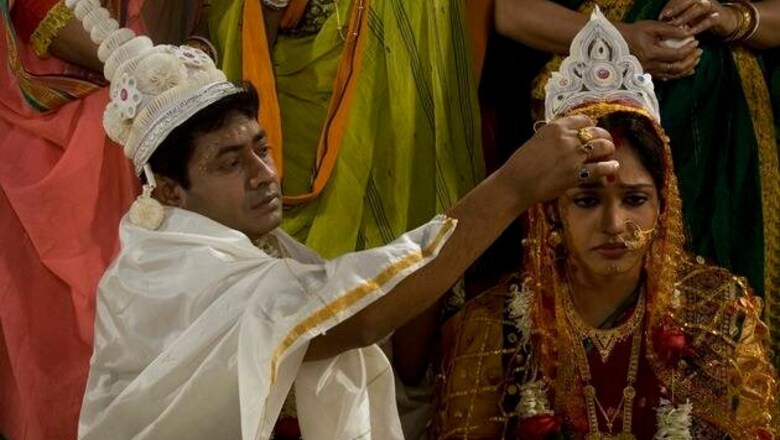
views
The story of Musalmanir Galpo, unlike most Tagore creations, is very cinema-friendly, message-oriented and carries a strong woman-centric statement.
It weaves itself around a young Brahmin girl called Kamala (Mumtaz Sorcar). As an orphan, this beautiful girl, talented in music is brought up by a kind uncle (Biplab Chatterjee) and an unkind aunt (Anamika Saha). Her life changes on her way to her husband’s home when a dreaded dacoit attacks the group to abduct her. She is rescued by Muslim philanthropist and social activist Habir Khan (Sudip Mukherjee).
Habir Khan places her in the special Mahal for rescued Hindu women. She slowly gets trained in militancy under Khan and falls in love with Khan’s second son Kabir (Indrajeet Chakraborty).
Happy with her metamorphosis into a woman of courage, grit and leadership skills, Khan christens her Meherjaan and pronounces her his successor by ceremonially handing her his flag.
In her first fight to save an endangered woman, Kamala/Meherjaan fights the dreaded dacoit gang forcing them to take flight to save her cousin Sarala on her way to her husband’s home.
The story runs over several tracks such as – a young girl’s journey from weakness to strength, from powerlessness to power, from victim to victor; or, the story that talks of a time when affluent Muslim leaders rescued women in distress notwithstanding their communal identity and ensured their religious faith by housing them in a separate Hindu abode where they could practice their faith without fear or discomfort.
There are also a couple of acidic potshots taken at affluent elderly Hindu zamindars who lusted after younger brides but ran away the minute they smelt trouble, leaving them in the lurch.
But the director kills all these layers simply by the wrong emphasis he places on all the wrong things at the wrong time.
There are too many flashbacks that spoil the continuity of the narrative and make no sense. Among these is the flashback into Habir Khan’s Hindu mother’s tragic past,and we remain in the dark about whether his father ever married his courtesan mother at all.
There is the needless iconisation of Habir Khan who, inspite of his claims to rescue oppressed and humiliated women in distress, is not shown rehabilitating them in any way other than giving them shelter in an exclusive abode and taking care of their basic needs.
The action scenes are good and well captured on camera. But the director chooses to streamline these scenes in favour of the long-drawn-out sob-scene melodramas in the earlier parts of the film.
There are so many songs in the film and very long ones too. Despite wonderfully mellifluous songs (Pandit Debjyoti Misra) belted out by some of the best voices in Bengali music, one is often confused whether the film is a musical, a period film, a Tagore film or a feminist statement. The music is as much the weakness of this film as it perhaps is also its strength.
The next to take the beating is the cinematography that is marred by wrong, theatre-like shot compositions in medium-shots and the visuals blurring away when the camera tracks back to take a long shot. The editing takes a beating for using the ‘full moon night’ as a bridging device – too hackneyed a strategy to bear fruit.
But there are some saving graces in this well-intended film that lost its way in the forests of multiple perspectives the director failed to take control of.
Mumtaz Sorcar in the title role is very good indeed and shows promise of delivering better performances in better roles. Sudip Mukherjee is equally good as her mentor/saviour Habir Khan except for the overlong speeches he is made to give that dilutes the dignity of the character.
The subtle, low-key romance between Kamala and Kabir is handled very well and so are the action scenes though the dacoit attacks are very amateurish to carry conviction.
Shankar Chakraborty is wasted in a badly written role as Kamala’s lecherous, drunken and ageing groom.
Musalmanir Galpo is reportedly the last short story Rabindranath Tagore wrote a month-and-a-half before he passed away. The story has provided fodder for a couple of telefilms earlier but without much success in terms of viewership rating points.
The first attempt to make a feature film on this unusual Tagore story had raised a lot of hopes considering the very good banner, Pitrashish Marketing Enterprises Private Limited that produced the film, and Pranab Chowdhury who directed it. But the film falls far below the promises made in the promos and the trailers.
Critic: Shoma A. Chatterji



















Comments
0 comment